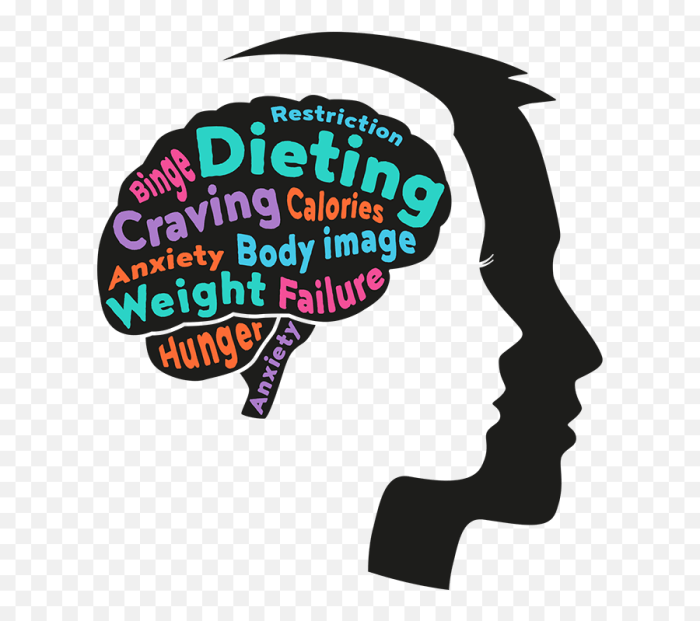Jenny is receiving psychotherapy for an eating disorder – Jenny’s decision to embark on psychotherapy for her eating disorder marks a courageous step towards reclaiming her health and well-being. Eating disorders, characterized by disordered eating patterns and body image disturbances, affect millions of individuals worldwide, and Jenny’s journey sheds light on the challenges and triumphs faced in the path to recovery.
This comprehensive exploration delves into the types of eating disorders, their prevalence, and the risk factors associated with their development. We will examine Jenny’s symptoms, the impact of her eating disorder on her physical and mental health, and her motivation for seeking professional help.
Overview of Eating Disorders: Jenny Is Receiving Psychotherapy For An Eating Disorder

Eating disorders are a group of mental illnesses that are characterized by abnormal eating habits. These habits can have a negative impact on a person’s physical and mental health. There are several different types of eating disorders, including anorexia nervosa, bulimia nervosa, and binge-eating disorder.
Eating disorders are relatively common, affecting up to 10% of the population. They are more common in women than in men, and they typically begin in adolescence or young adulthood. There are a number of risk factors for eating disorders, including genetics, personality traits, and environmental factors.
People with eating disorders often have a distorted body image. They may see themselves as overweight or obese, even when they are underweight. This can lead to them restricting their food intake or engaging in other unhealthy behaviors in an attempt to lose weight.
Eating disorders can have a number of serious health consequences, including malnutrition, heart problems, and kidney problems. They can also lead to depression, anxiety, and other mental health problems.
Jenny’s Journey

Jenny is a 20-year-old woman who is currently receiving psychotherapy for an eating disorder. She has been struggling with anorexia nervosa for the past three years. Jenny’s eating disorder began when she was 17 years old. She started restricting her food intake in an attempt to lose weight.
Over time, her eating disorder became more severe. She began to skip meals, exercise excessively, and purge after eating.
Jenny’s eating disorder has had a significant impact on her physical and mental health. She has lost a significant amount of weight and is now underweight. She is also experiencing fatigue, weakness, and hair loss. Jenny’s eating disorder has also led to depression and anxiety.
Jenny is motivated to seek treatment for her eating disorder because she wants to improve her health and get her life back on track. She is hopeful that psychotherapy will help her to develop healthier eating habits and a more positive body image.
Psychotherapy for Eating Disorders
There are a number of different types of psychotherapy that can be used to treat eating disorders. The type of therapy that is most effective will vary depending on the individual patient. Some of the most common types of psychotherapy for eating disorders include:
- Cognitive-behavioral therapy (CBT): CBT helps patients to identify and change the negative thoughts and behaviors that are contributing to their eating disorder.
- Family-based therapy (FBT): FBT involves the patient’s family in the treatment process. The therapist helps the family to understand the eating disorder and how to support the patient.
- Interpersonal therapy (IPT): IPT helps patients to improve their relationships with others. This can be helpful for patients with eating disorders who are struggling with isolation and loneliness.
The goals of psychotherapy for eating disorders include:
- Helping the patient to develop healthier eating habits
- Improving the patient’s body image
- Reducing the patient’s anxiety and depression
- Helping the patient to develop coping mechanisms for dealing with stress
The therapist plays an important role in supporting the patient’s recovery. The therapist provides a safe and supportive environment in which the patient can talk about their eating disorder and work towards recovery.
Jenny’s Treatment Plan

| Type of Therapy | Goals of Therapy | Frequency and Duration of Sessions | Expected Outcomes |
|---|---|---|---|
| Cognitive-behavioral therapy (CBT) | – Help Jenny to identify and change the negative thoughts and behaviors that are contributing to her eating disorder.
|
Weekly for 12 weeks | – Jenny will develop healthier eating habits.
|
| Family-based therapy (FBT) | – Help Jenny’s family to understand her eating disorder and how to support her.
|
Weekly for 12 weeks | – Jenny’s family will have a better understanding of her eating disorder.
|
Challenges and Successes
Jenny may face a number of challenges during psychotherapy. These challenges may include:
- Denial: Jenny may initially deny that she has an eating disorder.
- Resistance: Jenny may resist changing her eating habits and behaviors.
- Relapse: Jenny may experience setbacks in her recovery.
Jenny can develop a number of coping mechanisms to overcome these challenges. These coping mechanisms may include:
- Talking to her therapist about her challenges
- Using relaxation techniques
- Spending time with supportive friends and family
Jenny has made a number of successes in therapy. She has been able to:
- Increase her food intake
- Reduce her exercise
- Improve her body image
- Reduce her anxiety and depression
The Road to Recovery

Jenny’s long-term goals for recovery include:
- Maintaining a healthy weight
- Having a positive body image
- Being free from eating disorder symptoms
- Living a full and happy life
Jenny can maintain her recovery by:
- Continuing to attend therapy
- Practicing the coping mechanisms she has learned
- Surrounding herself with supportive people
- Avoiding situations that trigger her eating disorder
Recovery from an eating disorder is a journey. There will be setbacks along the way, but Jenny is committed to her recovery. She is hopeful that she will achieve her long-term goals and live a full and happy life.
FAQs
What are the different types of eating disorders?
Eating disorders encompass a range of conditions, including anorexia nervosa, bulimia nervosa, binge-eating disorder, and other specified feeding or eating disorders.
What are the risk factors for developing an eating disorder?
Risk factors include genetics, personality traits, psychological factors, and sociocultural influences.
What are the benefits of psychotherapy for eating disorders?
Psychotherapy provides a safe and supportive environment for individuals to explore the underlying causes of their eating disorder, develop coping mechanisms, and challenge negative thoughts and behaviors.